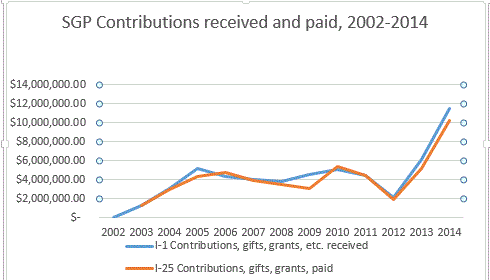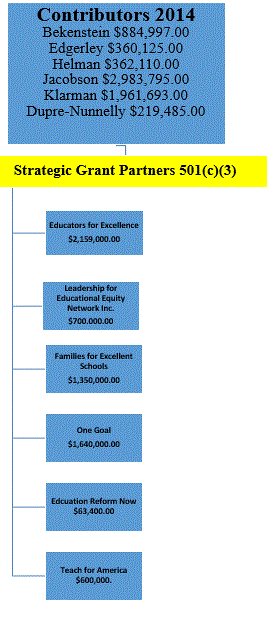As I noted in Great Schools or Great Scheme? the Boston Globe reported in January 2016 that privatization advocates would spend up to $18 million in their effort to increase the cap limiting the number of charter schools in the state. But that figure underestimated the amount of privatizer spending for three reasons.
First, the privatizers had been raising and spending money toward their goal in ways that did not have to be legally counted. Second, the organizations funding the political battle did not have to report to the Massachusetts Office of Campaign and Political Finance or Secretary of State. Third, the campaign to privatize public schools has not been confined to campaign year 2016 but extends back several years. The key to understanding the deployment of this hidden money is by examining the activities of an Internal Revenue Code 501(c)(3) organization known as Strategic Grant Partners (“SGP”).
A 501(c)(3) is a tax exempt nonprofit organization. One of the features of a 501(c)(3) is the tax deductibility of contributions. SGP is a private foundation, a type of 501(c)(3) that usually does not have active programs but funds other programs. Private foundations often have only one or sometimes a few donors and must disclose them in their tax forms, known as 990 PF forms. SGP in a given year will have fifteen to seventeen contributors, and most of them repeat their donations each year. Another feature of a private foundation that appeals to wealthy individuals is that it can be closely controlled by the donor. In the case of SGP the largest contributor is the 501(c)(3) Jacobson Family Foundation – a contribution of $2,983,795.00 in FY 2014. The President and Managing Director of SGP is Joanna Jacobson. An important limitation on a 501(c)(3) is that it is barred from political activity.
That is where 501(c)(4) “social welfare” charities come into play. They can become involved in political activities so long as politics is not their primary activity – think of the Koch Brothers national organization Americans for Prosperity, or locally the Massachusetts Fiscal Alliance. There is no tax deduction for contributions to a 501(c)(4) but donors may remain anonymous, thus the dark money problem Jane Mayer speaks of in her book – well – Dark Money. And a 501(c)(3) may contribute to a 501(c)(4).
And that’s what has happened with respect to Strategic Grant Partners, which has been around since 2002. Up to 2008 SGP seems to have limited its grants to charities in the family and education fields that were not involved in efforts to privatize education. In 2009, SGP made an initial $30,000.00 grant to Stand for Children and through 2013 contributed $1,685,000.00. Once upon a time Stand for Children was a grassroots organization of parents and educators but by 2009 it had been taken over by corporate privatizing interests. In the Boston mayor’s preliminary race in 2013 Stand for Children offered to make independent expenditures on behalf of candidate John Connolly, a tender worth up to $500,000.00 in the estimation of Boston Globe columnist Lawrence Harmon. Connolly spurned that offer.
Stand has been quiet in Massachusetts since but it heralded a change in SGP’s giving, so let’s look at SGP contribution records from their tax returns for FY 2002-2014:

Contributions to SGP and grants paid out are stable from 2003-2011, take a dip in 2012, and then skyrocket up over the years 2013-2014. So where did that extra money go? In 2013 SGP donated $800,000.00 to a group known as Families for Excellent Schools. Then in FY 2014 (July 1, 2013 – June 30, 2014) among its grantees were:

Families for Excellent Schools was likely the organizer for the rally with Governor Charlie Baker last September to kick off the effort to lobby for more charter schools (Will Keyser’s firm is registered as lobbyist for FES. Keyser was a key strategist for the campaign of Governor Charlie Baker). It was certainly FES that sent mailers into the districts of Senate President Stan Rosenberg and other senators earlier this year. Families for Excellent Schools has been involved in privatization campaigns in other states including New York, where according to Common Cause in 2014 it paid more for lobbying than any other interest. FES is a hedge fund money 501(c)(4) also backed by contributions from the Walton Foundation, Buck Foundation, and Broad Foundation – which also support the dark money Democrats for Education Reform. Another FES contributor is Seth Klarman, whose family foundation gives to SGP and who individually gave $40,000.00 to the ballot committee Public Charter Schools for Massachusetts in 2015. Massachusetts Secretary of Education Jim Peyser was on the FES board in 2014.
SGP also helped to introduce Leadership for Educational Equity into Massachusetts in 2014. LEE is a spinoff of Teach for America and according to Education Week assists TFA alumni in seeking leadership roles in their communities, including to elective office. LEE teaches advocacy, community organizing, and assists TFA alum with their campaigns. It also provides network access to people who give to privatization candidates. American Prospect got access to a LEE site that asserted that by 2015 it aimed to have 250 members in elected office, 300 in policy or advocacy leadership roles and 1000 in active community roles. LEE is a 501(c)(4) but its form 990 tax returns are not available through the IRS website.
Both of the newly funded 501(c)(4) organizations, FES and LEE, have a political focus. Educators for Excellence and OneGoal are 501(c)(3)s and should not be involved in politics, but their roles in Massachusetts bear watching as well. The contribution to Education Reform Now isn’t that big, but ERN is the funder of Democrats for Education Reform, which has spent millions in dark money in Massachusetts politics.
Let’s circle back to 2014 and take a look at the foundations and individuals that made their tax deductible contributions to SGP, and the most sizable new SGP grants in 2014. Except for Helman they all seem to be family foundations. (I assume the private foundations would have already afforded their contributors tax deductibility. I could be wrong, I’m no tax expert). In any case, SGP had seventeen contributors in 2014 but I’m going to focus on just six of them:

I chose these six contributors because they also were among the largest contributors in 2015 to the Public Charter Schools for Massachusetts ballot committee (now Great Schools Massachusetts ballot committee). They contributed $200,000.00 to that organization, money that mostly went into paying Mr. Keyser and hiring signature gatherers to get their question on the ballot in 2016.
Without further exhausting you, or me, let’s leave this off here. What we can say is that the privatization effort in Massachusetts is a construct of several wealthy families and that the campaign has been going on longer than is generally realized. Also, a good deal of the campaign is “off the books” – at least so far as campaign finance disclosure goes. Tracing this money is no casual task and the interconnections are vast. The privatization effort is much more expensive and hidden than we realize and there is no grassroots.
More to come.
Louis D. Brandeis: "We must make our choice. We may have democracy, or we may have wealth concentrated in the hands of a few, but we can't have both."

